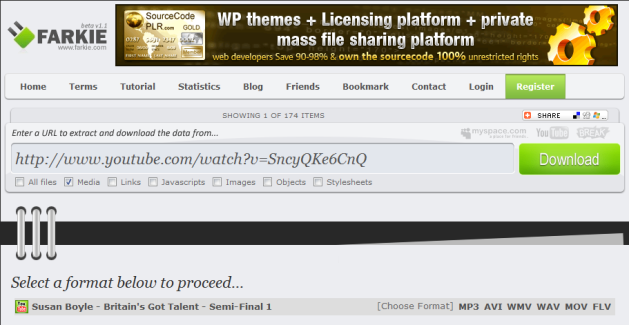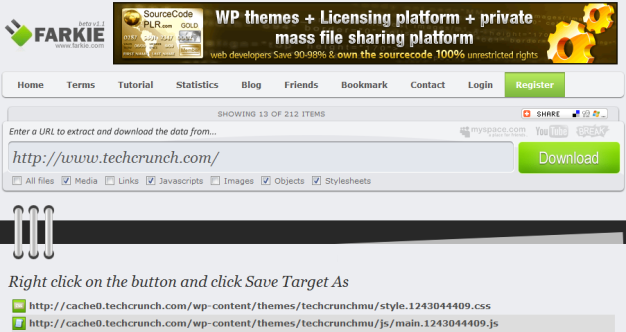The Latest from TechCrunch |  |
- Farkie Lets You Download YouTube Videos, MySpace Playlists And Much More
- Russian Investment Firm Poking Facebook For Board Seat
- This is Not a Sponsored Post: Paid Conversations, Credibility & The FTC
- Exclusive: Everything There Is To Know About Nokia’s Next Tablet
- Sonic The Hedgehog Races Onto The iPhone. But Do Its Fake Buttons Slow Him Down?
| Farkie Lets You Download YouTube Videos, MySpace Playlists And Much More Posted: 25 May 2009 07:46 AM PDT
All you need to do is copy-paste e.g. a public YouTube video URL, and Farkie will offer the video file to you in a variety of formats (MP3, AVI, WMV, WAV MOV or FLV). I converted the video of Susan Boyle’s performance in the semi-finals of Britain’s Got Talent and was able to download it in just a matter of minutes, albeit with a bit of quality loss. Firefox users can install an add-on that will dock a toolbar with which you can easily download videos by merely inserting the public URL and hitting a button. Likewise, by entering the URL to a public MySpace profile into Farkie and clicking download, you can easily extract the playlist from the page and display all of the songs found in the list, ready for download in MP3 format. You can also use Farkie to download scripts, stylesheets and images from any website, or to scrape Flash games from the multitude of online gaming sites out there. While this tool can come in handy quite a lot, I’m pretty sure some people - particularly at Google and MySpace - are not going to be happy with it. YouTube, for example, has in the past made it clear that it intends to crack down on services that allow for video downloads from the site - we should know -, especially now that it’s rolling out a video program of their own along with several of its partners. Enjoy Farkie while it lasts. Or check out similar services like File2HD.com as an alternative.
Crunch Network: CrunchGear drool over the sexiest new gadgets and hardware. |
| Russian Investment Firm Poking Facebook For Board Seat Posted: 25 May 2009 04:23 AM PDT
This is important, because we know Facebook recently received a term sheet for a similar venture round of funding at a lower valuation ($8 billion) which was turned down because it was based on the requirement of a board seat. By now, everybody knows well that founder and CEO Mark Zuckerberg is quite serious about retaining control over Facebook’s board of directors and hence that the requirement of a seat is a touchy subject for any new firm looking to buy a piece of Facebook. Now it seems that the investment proposal Digital Sky Technologies (DST) made to Facebook did in fact also require a board seat for its founding partner Yuri Milner, President of DST Advisors. It’s speculated that this would ease the path for DST to merge some of its social networking properties, which include Mail.ru, Odnoklassniki.ru, Nasza-Klasa.pl and particularly vKontakte.ru (a popular social network for Russian speakers with almost 35 million registered users and ironically, a Facebook copycat) with Facebook at some point in the future. We’ve contacted both DST and Facebook for comment. It’s important to note that it is still unclear whether Facebook has made any decisions around accepting or rejecting the investment offer made by DST, or even if it has already responded to its outreach in any way. But if the company ends up accepting the financing offer, we’ll know what how much the company values a board seat at: $2 billion. (Source: Russian business newspaper Kommersant, via Quintura Blog) Crunch Network: CrunchBase the free database of technology companies, people, and investors |
| This is Not a Sponsored Post: Paid Conversations, Credibility & The FTC Posted: 24 May 2009 11:53 PM PDT
In the eyes of imaginative and opportunistic advertisers and marketers, bloggers and online influencers are the new celebrities and athletes. Brands are showering them with endorsement deals rich with products, cash, trips, exclusive access to information, and VIP treatment each and every day, creating a new genre of star spokespersons. Many expert and lifestyle "citizen" bloggers and online weblebrities are creating communities around their personas as they freely and actively share personal and identifiable experiences online, in social networks and also in the real world. Those who can successfully connect their stories to others in and around their peer groups earn trust, visibility and authority - limited only by ambition and ingenuity. They’re rewarded for their presence and ability to point their followers in strategic directions. These new brand ambassadors are almost the perfect instruments for surreptitiously sparking and cultivating a groundswell of desire within desired target markets. Consumers look to experts and trusted peers for guidance and insight when making decisions. But who’s to say that the information they’re receiving from their trusted sources is indeed truthful and honest? Many of these followers are blind to the fact that some of these authorities are actually directly or indirectly compensated for their opinions and insights. Journalists and reporters on the other hand, most of them anyway, are held to strict editorial guidelines and policies that denounce the practice of receiving products, gifts or compensation in exchange for editorial coverage. There’s at least a line that separates ethical press from advertorials —whether it’s crossed, is another story. But in the new online world of citizen influence, there’s no line on the horizon—at least not yet. Driven only by loosely defined and sporadically practiced methodologies that promote at-will disclosure and transparency, many brands, intentionally or deliberately, are blurring a consumer’s ability to discern the distinction between partisan and genuine experiences. The New FTC Guidelines: Even Citizen Journalists Must Disclose Paid Endorsements That’s all about to change. Under new guidelines proposed by the Federal Trade Commission, brands and bloggers both may be held liable should either the FTC or scorned consumers deem that their actions or claims misguided them, or misrepresented the actual performance or efficacy of the product or service in question.. According to the FTC, the ability for a consumer to exercise better judgment and common sense is indefensible when a glaring absence of disclosure is pervasive. Earlier this year, The FTC published recommendations to update its guidelines concerning the use of endorsements and testimonials in advertising and public relations. A new set of guidelines, enforceable by the FTC Act, is due soon. The Guides, 16 C.F.R. Part 255, are designed to assist businesses and others in conforming their endorsement and testimonial advertising practices to the requirements of Section 5 of the FTC Act. The Guides interpret laws administered by the Commission and therefore are advisory in nature. However, proceedings to enforce the requirements of law can be brought under the FTC Act. The Commission would have the responsibility of proving that a particular use of an endorsement or testimonial was deceptive. In its review of the proposed guidelines, BusinessWeek observed, "The world’s more ambitious bloggers like to call themselves ‘citizen journalists.’ The government is trying to make sure these heralds don’t turn into citizen advertisers." I disagree with BusinessWeek’s observation and so does the FTC. In a discussion with Mary Engle, the acting deputy director for the Bureau of Consumer Protection, she articulated to me, "It’s not about preventing citizen journalists from becoming citizen advertisers, that’s just not true. We’re acting to ensure that bloggers don’t create a bias in the consumer decision-making process. Consumers just need to know that what they’re reading is technically an advertisement." Whether the post is compensated with cash or with free product or rewards, the FTC views them equally. Engle observed, "The real test is whether or not the consumer’s impression or decision would change if they knew the post was sponsored." The FTC Guides advise that an advertisement employing a consumer endorsement on a central or key attribute of a product will be interpreted as representing that the endorser’s experience is representative of what consumers will generally achieve. It’s about responsibility and credibility. But honestly, why chance it? The practice of paying bloggers and influencers or providing them with free products not only clouds their ability to share an impartial story, but also risks the credibility and trust of brands and influencers among the very people they’re trying to inspire and galvanize. With or without the new FTC guidelines, the practice of disclosure is not an option when the potential for significantly damaging customer relationships in a very public spotlight is at stake. Unfortunately, such disclosure is not at the forefront of most marketing programs. Free Products are Gifts that Keep on Giving Ignorance is bliss, until it’s not… In 2006, Microsoft introduced its Vista operating system to consumers using traditional and new media. In one of the programs, bloggers of varying levels of influence, received Acer Ferrari notebooks to potentially review and share their experiences of the OS and also the notebook. Initially, it wasn’t made clear to these bloggers that disclosure was encouraged. I saw many variations of the packages and letters. Depending on which version a blogger did or didn’t receive, instructions and intentions were also vaguely communicated. What was commonly perceived and understood by other bloggers and ultimately consumers, was that these expensive notebooks were theirs to keep whether or not they shared anything online. To say it created a blogstorm of controversy would be a gross understatement. The lessons learned here served as precedent for those seeking guidance, but didn’t necessarily translate intro industry-wide standards. Brands view the practice of sending products to bloggers and online influencers as a natural extension of their product PR campaign. In many cases over the years, companies simply didn’t expect to receive product back from reviewers, whether or not they were employed by a publication bound by editorial guidelines against the acceptance of gifts or free products. Bloggers and online influencers, until the recent FTC attention, were viewed no differently. Sending free products, according to the FTC, is viewed as compensation, which translates into an advertisement or paid endorsement. Under the FTC guidelines, disclosure is required in any case where the brand is hopeful of obtaining a published review of the product, when its return, either explicitly or implicitly conveyed, is not expected. This attempts to ensure the protection of all parties against liability or legal action. Sponsored Posts and Conversations Whether or not disclosure is evident and forthright, the question really is, whether or not the practice of giving gifts to encourage reviews or outright paying for them is ultimately effective and sound for channeling influence, community building and revenue generation for the long-term. I am now talking about “sponsored conversations”: outright paying for posts and conversations versus simply sending free product or rewarding influencers with various other incentives and hoping for complimentary posts and discussions in exchange. A recent report published by Forrester Research defines sponsored conversations as, "A marketing technique in which marketers provide financial or material compensation to bloggers in exchange for their posting blog content about a brand." In the report, which is available for $749, Forrester recommends adding sponsored conversations to the corporate marketing toolbox, "Sponsored conversation is controversial; many bloggers believe it threatens bloggers’ reputation for independence. But we think this practice is here to stay. Why? Because bloggers want to get paid and marketers want to pay them." According to the FTC guidelines, if there were a financial or other relationship between the advertiser and the endorser that would affect the credibility of the endorsement, that relationship would have to be disclosed under Section 255.5. So, as long as the blogger is clear that the post or conversation is "sponsored," all guidelines are respected and satisfied. Wait, what about the brand? Just because bloggers want to get paid and brands want to pay them, doesn’t make this a no-brainer business practice. Or, put another way, does it actually enhance the product/company brand or the personal brand of the blogger in the long run? Some of the biggest brands in the world are already experimenting with paid posts including, 1-800Flowers, Black&Decker, Cold Stone Creamery, Dell, Disney, MTV, Sears, Sony Pictures, and TiVo. For example, Kmart recently sent several high profile bloggers on $500 shopping sprees in exchange for "sponsored posts" about their experiences. I suppose, it’s in the way that you use it . . . So, let’s examine something of deeper impact and consequence. Every community thrives on interaction rooted in respect and defined by credibility and trust—at least that’s the way it’s supposed to work. For bloggers to risk or leverage their existing, and more importantly, potential credibility in exchange for blogola is either absurd or shortsighted. It might be simply gratifying and motivating for now. Maybe the bigger picture has yet to come into focus for many bloggers and the act of recognition is enough. And, for brands to either take generations of a brand ’s integrity or shape its new and emerging identification on the backs of bloggers who’ll loan their stature and reputation is brilliantly foolish. In the end, it’s the consumer who holds the power to decide his or her degree of affinity and affiliation or mutiny and backlash. Integrity and Reputation vs. Buzz and Google Juice The impending FTC guidelines and whether or not bloggers and brands are at risk of legal punishment isn’t the issue. We just have to deal with it. We can choose as consumers whether or not we want to engage with this content. The real discussion should center on why a company or blogger should even care to participate. The things we do for money are governed by personal boundaries. As individuals, we define those lines and how clearly we wish to view and abide by them. If we examine Forrester’s case for sponsored conversations, we’re essentially fueling word of mouth by paying for social or topical authorities to share their views about our company or product brand in their domain. This is important. We’re talking about paying people to write about a company or product on their existing, personally-branded content platform associated with it’s already existing, captive audience. This theoretically sparks Webwide buzz that connects a brand to the community of would be customers who rely upon these personalities and voices in the both the blogosphere and statusphere to make informed decisions. Seems simple enough, except two things are going to prevent this from effectively promoting the sponsoring brand over time — 1) disclosures read like warning signs; 2) Google is downgrading any blog or site that actively publishes paid content. Let’s walk down this path a bit farther . . . As a consumer, when’s the last time you read an advertorial and walked away inspired or informed? Other than the Snuggie or ShamWow, when is the last time you actually watched an infomercial, let alone bought a product or shared it with your friends because of what you viewed? Perhaps this is the wrong audience for a discussion probing the shrewdness of the typical consumer. But, I bet many of you reading this now are responsible for the direction, visibility, and perception of a brand. So as brand managers, your brand is what the market says it is, tethered to the credibility and stature of the people who collectively voice their thoughts about it (paid and unpaid). In the world of pay-per-posts or sponsored conversations, brand association starts to paint a picture of guilt by association, not necessarily the building of strategic brand presence or resonance. This is a deeper discussion of reputation and trustworthiness versus funding word of mouth buzz and viral marketing. To simply state that "disclosure" alleviates and resolves all risks involved with sponsoring conversations trivializes the discussion. Brand Ambassadors and Inspired Communities Whether we like it or not, many new companies are offering brokered services to facilitate "pay to play" campaigns in Social Media. Concurrently, many brands are also running these programs from within. Clearly a balance scale exists where integrity and paid buzz are on opposite sides. So the real question is, how do you leverage the laws of perception management in your favor? One way to do so is through traditional public relations. Identify target bloggers and work genuinely with them on developing a meaningful story that helps and informs their community. Bloggers will write about products and brands they really care about. You don’t have to pay them to do that. It comes naturally. This is not to say that there is no place whatsoever for paid endorsements on the Web. Obviously paid endorsements work when the platform for conveying paid messages is understood and accepted. Celebrities have effectively pushed products in commercials without tarnishing their brand for decades. Essentially, the difference is the forums and networks in which these paid messages appear and the fact that the celebrities are usually aboveboard about the fact that they are endorsements. Look to the existing business of paid endorsements to build and manage a campaign that effectively reaches and compels potential customers without the negative attributes that cling to pay-per-posts. Hiring or recruiting influential weblebrities and online experts is not unlike the model for linking real world celebrities to brands through commercials, events, appearances, or other dedicated vehicles to promote the alliance and the story. These campaigns, when conceptualized and executed properly, effectively link the product/company brand to the celebrity’s persona and prestige to convey a relationship that connects to consumers through their affinity to the spokesperson. The idea is to create and host a two-way street that still inspires word of mouth and viral marketing. For example: Mozy hired iJustine as an official spokesperson airing content on Mozy.com as well as across multiple social networks including YouTube and iJustine branded properties. Wal-Mart established Elevenmoms, an expert group of independent bloggers who receive free sample products to review and then freely choose which products to review based entirely on their personal opinion and experience. Baby-products manufacturer Graco launched the Graco Nation Ambassador Program, a dedicated community of select Graco fans. Based on the company’s successful foray into influencer relations with its Flex loaner program, Ford is currently trying to spark consumer buzz for its impending launch of the Ford Fiesta by enlisting every day consumers to share their experiences online and in social networks. In the end, sponsored conversations will continue to receive funding, as brands try to insert themselves into the conversations online. The FTC is simply striving for truth in advertising. The point is that when establishing a paid Social Media campaign, anything that is less than clear, honest, or actively contributing back to the bottom line of the business or to a brand’s resonance is actually taking away from it. (Photo credit: Flickr/Jennifer Rensel) Crunch Network: CrunchBoard because it’s time for you to find a new Job2.0 |
| Exclusive: Everything There Is To Know About Nokia’s Next Tablet Posted: 24 May 2009 07:35 PM PDT
Move over, Nokia N97. Your bigger, badder, unannounced brother is on the way - and one of our sources at Nokia has just clued us in on all of the details, from worldwide launch targets to hardware specs. Nokia's next tablet device is designed in the same vein as their N810, albeit significantly more polished. Though it doesn't appear to have an official name as of yet, it's referred to internally as "N900″, "Rover", or "Maemo Flagship". We'll be referring to this device as the N900 for the rest of this post, though it's quite possible that this name will change. Crunch Network: CrunchBase the free database of technology companies, people, and investors |
| Sonic The Hedgehog Races Onto The iPhone. But Do Its Fake Buttons Slow Him Down? Posted: 24 May 2009 05:24 PM PDT
Now, I’d consider myself a pretty experienced gamer, and there are few games that I feel more attached to than the original Sonic the Hedgehog series. At a time when most popular games consisted of hopping and bopping on enemy baddies at a leisurely pace, Sonic brought something new to the table: speed. Sonic could race across the screen at a breakneck rate, clearing entire levels in under a minute or two (if you knew what you were doing), with the framerate keeping up the whole way. And he had an edgier attitude to boot, making him substantially cooler than the colorful plumbers representing that other gaming company. So does the iPhone edition do justice to its console predecessor? To be honest, I was ready to bash the game when I first saw it. I’m not a fan of the control scheme some developers are adopting to port these classic games, which typically consists of a virtual joypad in the bottom left hand corner of the screen with a few virtual buttons on the right side. Visually the buttons successully mimic the gamepads of yore, but they lack any tactile feedback at all, which gets frustrating when you’re trying to dodge bullets or leap from cliffs and you accidentally hit the wrong button.  Fortunately, Sonic doesn’t suffer too badly. Make no mistake, the controls are far from perfect, and I’d prefer a gamepad to a glass screen any day, but Sonic’s simplicity keeps it mostly playable. This is primarily because the vast majority of the time you’re going to be holding down the right arrow button, with occasional quick taps to the left, so your thumb doesn’t have to do much hunting. But while the controls are acceptable, the game suffers badly from lag - an oddity given that Sonic was originally supposed to show how fast the Genesis was. It’s unclear if this is something that could be fixed with a software update or if the iPhone’s RAM and CPU simply can’t keep up with the blue hedgehog, but the gameplay definitely suffers. I found myself plummeting onto deadly spikes far more often than I should have been, and I’d like to think most of those falls weren’t due to rusty thumbs.  In any case, I think the game is worth a download, particuarly if you were a fan of the original. That said, I’m hoping that if Sonic is a hit for Sega, developers don’t take it as an indication that they should be porting every game in their archive with this virtual joypad setup. Because frankly, it often stinks, and is only passable in this case because of Sonic’s basic control scheme. Sega has apparently built an iPhone emulator using the joypad that would allow them to pump out these games at a rapid fire pace, and at this point I’m not sure that’s a good thing. Fortunately the iPhone 3.0 software update will allow for the release of actual joypads that can plug into the phone, which would make it a device that could really do these classics justice. Crunch Network: CrunchGear drool over the sexiest new gadgets and hardware. |
| You are subscribed to email updates from TechCrunch To stop receiving these emails, you may unsubscribe now. | Email delivery powered by Google |
| Inbox too full? | |
| If you prefer to unsubscribe via postal mail, write to: TechCrunch, c/o Google, 20 W Kinzie, Chicago IL USA 60610 | |



 When the WSJ
When the WSJ 

 The iPhone is quickly becoming the platform of choice for nostalgia-inspiring classic games, with releases like
The iPhone is quickly becoming the platform of choice for nostalgia-inspiring classic games, with releases like
No comments:
Post a Comment